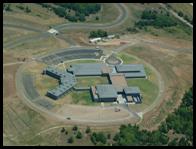Basic Training at the K.O Rayburn Training Center
|
Basic Law Enforcement Academy Life
Each police academy graduate will complete 14 1/2 weeks of intensive on-site training intended to give them the core knowledge necessary to work as a peace officer. The Academy is semi-paramilitary in nature, and requires some degree of discipline. After a 6:00 am. breakfast cadets begin the day with classroom training at 7:00 a.m. The cadet’s day ends with "lights out" at 10:00 pm.
Cadets receive both classroom and practical firearms training at the Academy's state-of-the-art firing range. They also receive practical and problem-based training on everything from traffic stops and defensive tactics to building searches. Motor vehicle stops can even be simulated inside the facility, in the Multi Purpose Room, which can hold several vehicles. The grounds also include a self-contained Law Enforcement Driver Training Course for driving exercises. The academy has two "skid cars" which can simulate less-than-ideal driving conditions, including glare ice, on ordinary pavement.
|
 |
|
The academy's Basic course for new peace officers consists of 576 hours of training in a variety of areas. Criminal and traffic law, firearms, emergency vehicle operations, defensive tactics, first aid and human relations and ethics are some of the major areas of instruction during this course. Other police related subjects such as accident investigation, criminal investigation, domestic violence and sexual assault, Standardized Field Sobriety Testing, radar operations, drug and narcotics crimes, alcohol crimes, and firearms training are included in the areas an officer must study and pass before graduating. The course of study is designed to incorporate problem based learning as well as classroom exercises so the officers have a better idea of how to react to situations they will encounter when they return to their departments and agencies. |
Law Enforcement Driver Training
Training begins with classroom lectures on topics including operational guidance, legal principles, officer liability, vehicle dynamics, risk management and the process of decision-making needed for collision avoidance. Next, the cadets use what they've learned in the classroom in practical driving situations that demonstrate the risks involved in emergency response and pursuit driving. Through the understanding and applied knowledge of the vehicle, reading the roadway, driving skills and behaviors promoted during emergency vehicle operations, basic cadets are able to successfully control the stress commonly associated with operating an emergency vehicle. They also learn vehicle handling and weight transfer techniques for high speed emergency response and pursuit driving. All cadets are instructed in the proper use of tire deflation devices. The student must pass each segment of the driving instruction and a comprehensive written examination.
|
|
 |
|

|
|
Firearms Training
Cadets receive lecture and practical firearms instruction from seasoned firearms instructors. Topics include handgun safety and maintenance, fundamentals of shooting, malfunctions, and use of the shotgun. Students must shoot a minimum qualifying score with their weapons and pass a comprehensive written examination.
|
Traffic
Cadets receive detailed lecture and practical vehicle accident training from experienced accident investigators. Utilizing appropriate information, diagramming skills and a variety of proven scientific and mathematical formulas, students must satisfactorily demonstrate both practical and written proficiency in documenting vehicle accident scenarios.
|
|
 |
|

|
|
Criminal Investigation Training
Cadets receive lecture and practical instruction from veteran criminal investigators which includes interviews and statements, crime scene behavior, interrogations, child abuse, first responder responsibilities, reports writing death investigation, blood splatters and collection of evidence. Students must demonstrate a practical proficiency in conducting a criminal investigation of a scenario.
|
Defensive Tactics Training
Cadets receive lecture and practical training in defensive tactics from skilled defensive tactics instructors. This includes training in pressure points, joint locks, handcuffing, strikes/blocks/combinations, straight baton, ground fighting and weapon retention. Students must demonstrate a proficiency in each of the areas and pass a comprehensive written examination.
|
|
 |
 |
|
Patrol Tactics, Domestic Violence and Sexual Assault Training
The academy provides detailed domestic violence and sexual assault training. Basic cadets will receive training involving victim and officer safety, legal issues, impact of arrest, intervention and investigation and victim assistance.
|
|
Computer Lab
The academy is equipped with a state of the art twenty station computer lab used by student for writing reports and other work as assigned. Cadets may also use the lab for checking and sending e-mail as well as completing research assignments for Criminal Investigations classes.
|
|
 |
Last updated/reviewed January 27, 2009
|
Information
<-- Basic Academy
Academy Coordinator's Message
Academy Schedule
Full Time Peace Officer Fact Sheet
Notification of Psychological Evaluation (For Peace Officers)
Fingerprint Clearance Affidavit for Peace Officers
Employment Status Report (ESR) - Law Enforcement Only (PDF):
Tribal ESR (PDF)
|

